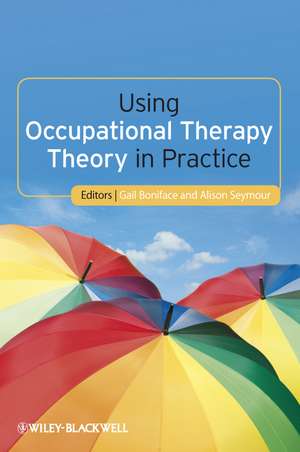Using Occupational Therapy Theory in Practice
Autor G Bonifaceen Limba Engleză Paperback – 20 feb 2012
Preț: 290.46 lei
Preț vechi: 305.75 lei
-5% Nou
55.60€ • 60.41$ • 46.73£
Carte tipărită la comandă
Livrare economică 21 aprilie-05 mai
Specificații
ISBN-10: 1444333178
Pagini: 208
Ilustrații: colour line drawings, figures
Dimensiuni: 152 x 229 x 10 mm
Greutate: 0.27 kg
Editura: Wiley
Locul publicării:Chichester, United Kingdom
Public țintă
Undergraduate and postgraduate occupational therapy students; practising occupational therapistsDescriere
Competence in any profession depends upon an understanding of the theory that underlies it. This concise and practical text for students and practitioners bridges the gap between occupational therapy theory and practice, offering highly practical advice on using theory in a wide range of settings. It considers the nature of professional practice and the need for a sound theoretical basis from which to plan, implement and justify interventions, and investigates the practical use of occupational therapy theory and the issues such use raises in health and social care settings from a European perspective.
Every occupational therapy student worldwide needs to know about the underlying theory of their profession and its use in practice. The book particularly debates the nature of the theory of occupational therapy via the introduction of the concept of models of the profession as an umbrella for practice. The use of this umbrella is then brought to life via a range of case studies and practice situations, incorporating expert advice, reflection exercises as well as some practical ideas for assessment and evaluation forms.
Textul de pe ultima copertă
Competence in any profession depends upon an understanding of the theory that underlies it. This concise and practical text for students and practitioners bridges the gap between occupational therapy theory and practice, offering highly practical advice on using theory in a wide range of settings. It considers the nature of professional practice and the need for a sound theoretical basis from which to plan, implement and justify interventions, and investigates the practical use of occupational therapy theory and the issues such use raises in health and social care settings from a European perspective.
Every occupational therapy student worldwide needs to know about the underlying theory of their profession and its use in practice. The book particularly debates the nature of the theory of occupational therapy via the introduction of the concept of models of the profession as an umbrella for practice. The use of this umbrella is then brought to life via a range of case studies and practice situations, incorporating expert advice, reflection exercises as well as some practical ideas for assessment and evaluation forms.
Cuprins
Contributor biographies v Foreword xi
1 Introduction 1
Gail Boniface and Alison Seymour
Section 1: Theory
2 Reconfiguring professional thinking and conduct: a challenge for occupational therapists in practice 9
Della Fish and Gail Boniface
3 Defining occupational therapy theory 21
Gail Boniface
4 FromStrands to The Invisibles: from a technical to a moral mode of reflective practice 38
Della Fish
5 The use of self in occupational therapy 49
Alison Seymour
Section 2: The Use of Theory in Practice: Some Practitioner Narratives
6 Developing the use of the Model of Human Occupation in a mental health service 63
Linda Keelan and Lisa John
7 Using Reed and Sanderson′s Model of Adaptation through Occupation: a journey 76
Karen Lewis and Sharon James
8 Using the Canadian Model of Occupational Performance to reconfigure an integrated occupational therapy service 91
Sian Waygood, Margot Mason, Heather Hurst, Tamsin Fedden and Caroline Phelps
9 Dealing with the barriers to change whilst implementing the Canadian Model of Occupational Performance 106
Jane Walker and Gillian Thistlewood
10 Developing occupational therapy theory in Poland 120
Ania Pietrzak and Magdalena Loska
11 Using occupational therapy theory in Croatia 128
Andreja Bartolac
12 Personal reflections on understanding and using the Model of Human Occupation in practice 141
Sarah Cook
Section 3: Contemporary Discussions on the Use of Theory in Occupational Therapy Practice
13 Using occupational therapy theory within evidence–based practice 155
Carly Reagon
14 Occupational science and occupational therapy: a contemporary relationship 165
Jill Riley
15 Myths around using theory in occupational therapy practice 180
Alison Seymour, Gail Boniface and Louise Ingham
Index 189
Recenzii
"Overall, this edited text provides relevant food for thought for all therapists and would challenge students to consider serious implementation issues." (Canadian Journal of Occupational Therapy, December 2012)















